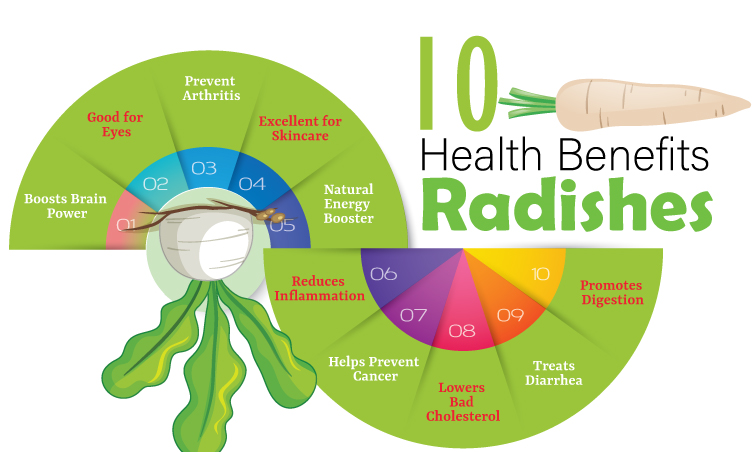What Are Radishes?
Radishes are root vegetables that are usually red, white, or purple. They're related to cabbages and the Brassica family, but they're hot and peppery rather than mild.
Radish leaves are edible, but they're very peppery and strong-tasting. You can use them in stir-fries or other Asian dishes.
Many people don't know that the root vegetable we know as Radish is a kind of turnip. These two vegetables are similar in nutritional value, but radishes have a much shorter growing season.
Nutritional Value of Radishes
So are radishes good for you? Of course, they are!
When it comes to Radishes' nutrition, they're low in calories but high in fiber and vitamins C, B6, and K. In addition, radishes are a good source of iron and calcium.
One serving provides 10% of your daily iron requirement and 8% of your calcium. A 1-cup serving of radishes also provides you with 10% of your daily vitamin C requirement, 5% of your daily B6 requirement, and 2% of your daily B12 requirement.
Types of Radishes
There are different varieties of radishes. The most common kinds are French Breakfast radishes (red), Cherry Bomb or Cherry Belle radishes (red), and White Icicle radishes.
French radishes are used primarily for breakfast, the most common variety of radishes. They're red, have a mild peppery flavor, and have a short growing season.
10 Health Benefits of Radishes
So, now let's cut the clutter and get to the point. What are radishes good for?
Radishes are full of essential fiber and vitamins. A 1-cup serving of raw radishes provides 10% of your daily vitamin C requirement, 5% of your daily B6 requirement, and 2% of your daily B12 requirement. That means there are endless benefits of eating radishes.
But for this blog, we would keep the benefits of Radishes to the 10 most important ones.

1. Reduces Inflammation
Radishes are loaded with vitamin C and beta-carotene, two antioxidants that help fight off free radicals, the chemicals that cause damage to cells and lead to disease. These compounds also lower cholesterol levels, boost immunity, and reduce blood pressure.
2. Promotes Digestion
The high fiber content in radishes helps keep digestive systems running smoothly. Fiber aids in keeping stools soft and regular, preventing constipation. The radish fiber helps prevent constipation, diverticulitis, and other digestive issues.
3. Treats Diarrhea
Diarrhea is a condition where watery stools occur frequently. Radishes contain fiber, which helps treat diarrhea. Fiber also reduce bloating and gas .
4. Lowers Bad Cholesterol
Radishes have been shown to lower cholesterol in people who eat them regularly. A study showed participants who ate half a cup of cooked radishes each day had significantly lower total cholesterol than those who didn't.
5. Helps Prevent Cancer
The efficacy of Radish in preventing cancer is being studied by experts worldwide. So far, research seems to indicate that women who consumed three servings of radishes per week were less prone to develop breast cancer than women who did not consume any radishes.
6. Boosts Brain Power
Beta-carotene, the carotenoid pigment found in radishes, is known to improve memory and concentration. A study found that children who ate carrots for breakfast outperformed those who skipped the vegetable in terms of academic performance.
7. Good for Eyes
Vitamin K is one of the B vitamins that's critical for eye health. Research shows that adults who get enough vitamin K in their diet tend to have a healthier vision. If you don't prefer the bitter taste, try alternatives like spinach, kale, and swiss chard.
8. Prevent Arthritis
As Radishes are super anti-inflammatory, they are a great way to protect yourself from chronic conditions like rheumatoid arthritis and osteoarthritis. Studies show eating radishes daily can help ease joint pain associated with these ailments.
9. Excellent for Skincare
Radishes are packed with Vitamin C, beta carotene, and anthocyanins, making them an excellent ingredient for homemade beauty products. Use radish juice to cleanse your face or rub the fresh roots over dry skin to moisturize and nourish.
10. Are a Natural Energy Booster
Eating radishes throughout the day may give you the extra energy to get things done. In addition, they're high in vitamin B6, which supports normal nerve function and brain activity.
In addition, there are few calories in Radishes. But they are packed with healthy fiber and vitamins. Munch on them without worrying about gaining unhealthy fat.
Last but not least, Radishes are easy on your pockets. This veggie is quite affordable and available easily at your nearest grocery store.

How to Select and Store Radishes
Radishes are usually available year-round. They're best when fresh, but you can store them for up to 2 weeks.
● Look for radishes that are firm and free of blemishes. If a radish is wilted or limp, it's not fresh.
● If you've bought radishes that feel soft to the touch or have an off smell, throw them away.
● Always store radishes in a plastic bag in the fridge crisper or drawer.
● Cut off the green tops (where the roots are) before storing.
● Eat radishes within a few days of purchasing them.
Cooking with Radishes
Radishes are versatile and can be used in sweet and savory dishes. They are also easy to prepare. If you don't have the time, You can also eat them raw, roasted, or steamed. You will still get all the radish benefits.
To make the most out of radishes nutrition, follow these pro tips:
● Combine them with salads for a peppery flavor, or try them in a stir fry.
● Roast them with other root veggies such as carrots and potatoes. Add a bit of honey and pepper to kick them.
● Use radishes in savory dishes like soups, stews, and curries.
How many Radishes Should you Eat?
The calories in Radishes are pretty low. So you can eat them regularly. Add at least 1/3 of a cup of them to get the best out of them in your meal. If you have not eaten any radishes before, they will taste bitter at first. But you will get used to them. Add a little bit of honey to neutralize the butter taste.
Downside of Radishes
Radishes are known to be harsh, but they have a mild flavor when cooked. They're slightly peppery but not overpowering. Like other root vegetables, radishes can be high in carbohydrates, depending on the variety. While radishes are low in calories, they're also low in protein and fat.
Wrapping up
Radishes are full of vitamins, minerals, and fiber. They are a true superfood with low calories and fat, making them an ideal vegetable for a healthy diet. Radishes are best when eaten raw or added to salads, but you can also roast them or use them in stir-fries.
So next time you are in a grocery, don’t forget to add these nutritious root vegetable to yoru bucket.



 Contact Us
Contact Us






 Hospitals
Hospitals
 Doctors
Doctors
 Diagnostic
Diagnostic
 Pharmacy
Pharmacy
 Health Tips
Health Tips
 Blog
Blog



















Comments